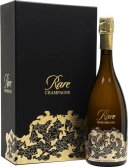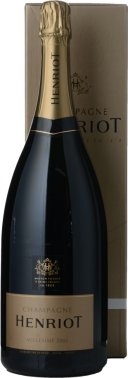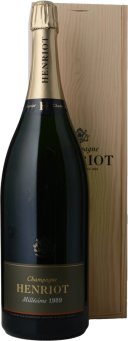Dom Pérignon Rosé
Dom Pérignon is the most famous name in the world of Champagne. It's iconic history has permeated into global popular culture, yet still retains it's standing as the pre-eminent producer of Champagne. A magnificently fine rosé with a subtle, sensous and elegant palate. Full of complexity, concentration and power.
Piper-Heidsieck Rare Millesime Champagne
Structured, full-bodied and fruity, this Peper-Heidsieck Rare Millesime Champagne has delicate, muted exotic fruits and mild spices on the nose. This is a wine with depth but also it has a harmonious lengthy finish.
M chapoutier Ermitage de L'Oree Blanc
One of the longest-lived white wines in France, the extremely rare M.Chapoutier Ermitage de lOrée is a single varietal Marsanne sourced from a single vineyard Murets plot at the eastern edge of the Hill of Hermitage. Orée means edge in French and is also a reference to the colour of the wine as or in French means gold. Rich, full-bodied and immensely complex, Ermitage de lOrée has the structure and concentration to age often well beyond 50 years.
Vincent Dauvissat Sechet 1er cru
Henriot Brut Millesime
Pommery Brut Royal Non-Vintage Jeroboam
Established in 1836, Madame Pommery is credited with creating the first vintage ‘brut’ style of Champagne in 1874, at a time when most champagnes were excessively sweetened with sugar. This revolutionary dry style set the benchmark for the rest of Champagne and it is in this spirit that the style of Pommery endures; with each cuvée displaying sublime elegance, finesse and freshness. Brut Royal NV has incredible balance and is a cheerful, lively and delicate wine.Pommery is one of the few Champagne houses that produce the large formats in their original bottles, to allow for optimal ageing. The Jeroboam comes individually packed in a timber case.
Robert Weil Monte Vacano Riesling Trocken
Within Kiedrich’s Gräfenberg Grand Cru lies a small 0.5-hectare parcel once known as the Gräfenberg-Lay. Sitting in one of the steepest portions of the vineyard, the Lay is located at the transition between Gräfenberg and Turmberg and is known for having the highest concentration of phyllite slate on the hill. The vines here are now between 40 and 60 years old. This site was originally purchased by Dr Robert Weil in the 19th century, using the dowry from his marriage to Emilie von Vacano (a descendant of the Vacano family in Lombardy). The wine from this parcel, called Monte Vacano (the Hill of Vacano) was always produced and bottled alone. It was used only for celebratory occasions and never released for sale. Following Weil's death in 1921, the tradition of Monte Vacano fell dormant, and the fruit was incorporated into a regular Gräfenberg bottling. Compared to the Gräfenberg GG, Monte Vacano trades power and richness for exceptional purity, elegance and detail. Resurrecting the old custom, 2021 marks the fourth Riesling in a century made solely from this special lieu-dit. It was harvested in October, and the grapes were whole bunch-pressed into two ancient refurbished Stückfässer (1,200-litre casks) where the wine fermented wild and spent almost two years on lees before bottling.

















